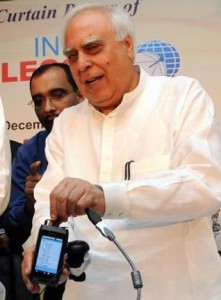 The Telecom Minister, Kapil Sibal has written to a committee of state finance ministers asking them to declare mobile phones and tablets as goods of special importance under Central Sales Tax Act, which may lead to the gadgets becoming cheaper by 7-8 per cent, sources said.
The Telecom Minister, Kapil Sibal has written to a committee of state finance ministers asking them to declare mobile phones and tablets as goods of special importance under Central Sales Tax Act, which may lead to the gadgets becoming cheaper by 7-8 per cent, sources said.
“Considering the huge potential that mobile phones and tablets have in transforming the overall development of the country…Sibal has requested that the Empowered Committee of the State Finance Ministers may consider the proposal to declare mobile phones and tablets as goods of special importance under the CST (Central Sales Tax) Act of 1956,” a source said.
The committee is headed by the Deputy Chief Minister of Bihar, Sushil Kumar Modi.
The Telecom Minister has also requested state Chief Ministers to declare mobile phones and other electronic products used for Internet access under the category as approved under National Policy on Electronics, 2012, the source added.
Most of the states levy tax over 12.5 per cent on mobile phones. Under present rules, the state governments can impose maximum of 5 per cent tax on any product that is a good of special importance under CST Act, 1956.
“If states act on this request of the Telecom Minister, the price of mobile phones and tablets in most of state will come down by 7 to 8 per cent. This will be in states like Maharashtra, Gujarat, Tamil Nadu, Chattisgarh, Madhya Pradesh,” Pankaj Mohindroo, President, Indian Cellular Association (ICA) said.
He said some other states like Delhi have dual taxing mechanism whereby taxes are levied on number of units sold in the state.
The ICA President said the move will act as a deterrent to grey market and state governments should work on rationalisation of taxes on mobile phones.
“Many Chinese phones sold in grey market don’t pay VAT (Value Added Tax). It is very ironical to see that a laptop costing Rs 1 lakh is taxed at 5 per cent rate where as mobile phone which comes at low price is taxed at rate of more than 12.5 per cent in many states,” Mohindroo said.
Sibal writes to states for special status to mobiles: Sources












